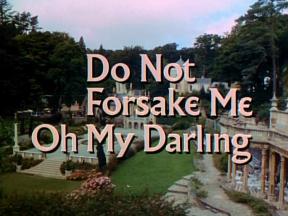 Do Not Forsake Me Oh My Darling
Do Not Forsake Me Oh My DarlingTransmission Date: 22/12/1967
Episode Length: 48'27m (DVD timing)/50'17m (Blu-Ray timing)
Est. Ratings: 7.3m
Written by: Vincent Tilsley
Directed by: Pat Jackson
DVD availability: Try amazon.com
Production Commenced:
August 1967
Production Credits:
An ITC Production by Everyman Films Ltd. Executive Producer: Patrick McGoohan; Producer: David Tomblin; Production Manager: Ronald Liles; Director of Photography: Brendan J. Stafford B.S.C.; Art Director: Jack Shampan; Camera Operator: Len Harris; Editor: Eric Boyd-Perkins; Theme: Ron Grainer; Musical Director: Albert Elms; Assistant Directors: Gino Marotta, Ernie Lewis; Sound Editor: Will Thompson; Sound Recordist: John Bramall; Music Editor: Eric Mival; Casting Director: Rose Tobias-Shaw; Continuity: Ann Besserman; Set Dresser: Colin Southcott; Make-Up: Frank Turner; Hairdressing: Olive Mills; Wardrobe: Masada Wilmot and Fight Arranger: Jack Cooper. Made on location and at Metro-Goldwyn-Mayer Studios, Borehamwood, England.
Starring:
Zena Walker (Janet); Clifford Evans (No.2); Nigel Stock (The Colonel); Angelo Muscat (The Butler); Hugo Shuster (Seltzman); John Wentworth (Sir Charles); James Bree (Villers); Lloyd Lamble (Stapleton); Patrick Jordan (Danvers); Lockwood West (Camera Shop Manager); Frederic Abbott (Potter); Gertan Klauber (Cafe Waiter); Henry Longhurst (Old Guest); Danvers Walker (First New Man); John Nolan (Young Guest) and William Lyon Brown (Undertaker/Waiter, uncredited). Cameo Appearance by Patrick McGoohan (The Prisoner)
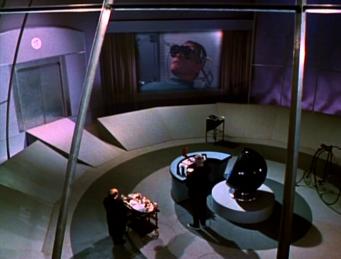
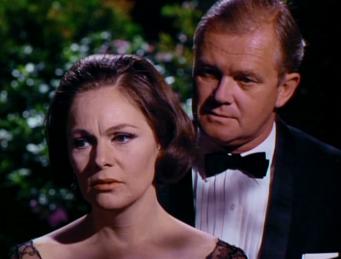
Episode Order:
From this point on, all the episodes are ordered as they were broadcast. Although there's a line of dialogue that states this takes place just a "year" after Arrival, putting a dozen episodes into a twelve month period, it's perhaps safe to disregard any serious attempt at continuity in what is clearly just a filler episode...
No.6:
In France, No.6's code is Duvall. In Germany, it's Schmitt. His number is ZM73, and he has been away for a year. We finally learn that No.6 is engaged, to a Janet Portland. Her father, Sir Charles Portland, is also No.6's boss. He is a keen rosarian and his favourite dish, like No.6's, is gunchar.
An old friend of No.6's is Professor Seltzman, a man born in Kandersfeld, Austria. His scientific experiments have led to him being hunted by the Village. We learn that No.6 had written to Seltzman before being abducted, at Seltzman's then address of "20 Portmerion Road, (This is an in-joke on the real-life location of the Village) Filey Clyde, Scotland". The letter was apparently posted from Greenford, Middlesex, at 2pm on 10th May 1967. Is the potential misuse of Seltzman's "mind swapping" device the reason why No.6 resigned on principle?
Someone else who No.6 is aware of is the man who sits at the desk in the title sequence. (Previously this had been George Markstein, though for obvious reasons he didn't reprise his role here - see "Trivia"). The man sitting at the desk now is a younger man, Jonathan Peregrine Danvers. Born in Bootle, he took elocution lessons and came to London during the civil service in 1948 as a junior clerk. He was moved to "this department" three years later "mainly at the request of the typing pool". The final thing we learn about Danvers is that he took a trip to Paris in 1958 with a woman of which we learn nothing.
In The Village:
The Village has new technology, a machine invented by Professor Seltzman, that can "transmit the psyche of one person into another".
An "amnesia room" is seen for the first time, where the Village can wipe the memory of a person back to any point they choose. In this instance it has been used after they have forced a confession from a prisoner. They will then regress his mind so that he never remembers the Village.
The Colonel in the story has never met No.6, nor has he heard of Seltzman ("In your kind of business I suppose not" says No.2). However, he does confirm that he knows the gender of No.1. While it has generally been implied throughout the series that the various No.2s have been speaking to No.1 on the phone, this is the only time before the conclusion that he is directly referenced. "You must contact No.1 and tell him I did my duty" the Colonel urges No.2.
Storyline:
A Colonel arrives at the Village, sent there "on the highest authority". It is implied this authority is that of Sir Charles Portland, and that Sir Charles is instrumental in No.6 being sent to the Village. He is required as the Village, and Sir Charles, want to track down Seltzman. The Colonel's psyche, using Seltzman's machine, is placed in No.6's body, while No.6's mind is transferred to that of the Colonel. By doing this, the Village knows that No.6 will attempt to track down Seltzman in order to reverse the process.
After waking up in his old house, No.6 visits a photo shop to pick up some slides (the slides having already been taken and returned by a "Mr.Carmichael". He returns home, and, using every second letter of Seltzman's name (ie. E, T, M and N) works out the corresponding number - 5, 20, 13 and 14. With this he takes the fifth, twentieth, thirteenth and fourteenth slide from the run of 36 and places them together in a projector. Together, when viewed with special lenses, they spell out Seltzman's location: "Kandersfeld, Austria".
Escape:
After tracking down Seltzman, they are both captured by agents working for Sir Charles and taken back to the Village (intriguingly, despite the events of The Chimes of Big Ben and Many Happy Returns, No.6 still tells Seltzman he doesn't believe it's his own side running the Village). There the process is reversed, except Seltzman has advanced his technology to such a degree that it works three ways; No.6 back in his own body, Seltzman's in the Colonel's and the Colonel in Seltzman's body - which dies from shock. However, before the Village realise what has happened, Seltzman has escaped by helicopter. No.6 states that Seltzman is now free to carry on his experiments in peace, but what's to stop him being brought back to the Village again?
Trivia:
Drafted in for what was then proposed as the start of a thirteen-episode second series, Tilsley, (writer of The Chimes of Big Ben), came up with a story that involved a travelling circus. However, McGoohan�s work on the Hollywood movie Ice Station Zebra meant this was not possible, and so a storyline (working title Face Unknown) was thrust upon him. Eventually Tilsley left as he found the story too difficult, and rewrites were performed by David Tomblin without his permission. A point of note is that the original script gave the date of No.6's resignation: July 13th.
The only episode (other than the recap to Fall Out) to have a pre-credits sequence. This involves Charles Portland enquiring after the whereabouts of Seltzman and leads into the usual titles. However, the music used from when No.6 awakes to when he sees the episode title is different, and the "Where Am I?" exchange with No.2 is absent altogether.
This is also the first episode to be completed without the original production team, many of them having left when the series was cut short to just four episodes left. This, of course, included George Markstein, who, after a bitter dispute with McGoohan, left the series with no script editor. From this point onwards McGoohan was also no longer credited as "Executive Producer".
The title comes from the theme song to High Noon, and was originally the working title for Living In Harmony. This could refer to his fiance forsaking him, or maybe the line that follows in the song, "I must face the man who hates me", which would be apt as No.6 looks in the mirror. More likely, however, is that it was the alledged in-joke of the production team about McGoohan leaving them behind to film in Hollywood. An interesting moment is when No.6, in the body of the colonel, moves in to kiss Janet for a fourth time. The scene fades to black, implying that they make love. If No.6 ever got to see Janet when he's back in his own body, would it not feel like she'd slept with another man?
With estimated viewing figures of 7.3 million, this was the lowest rated episode of The Prisoner on first run, just below A Change of Mind's 7.5m.
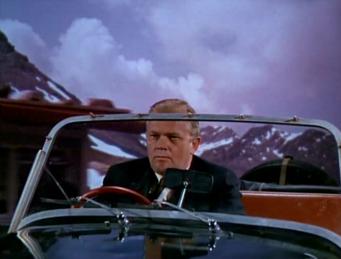
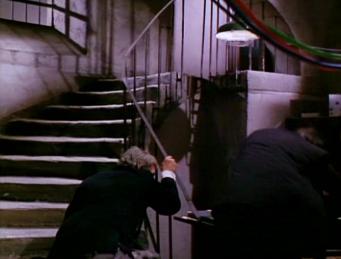
"Couldn't you say 'Nobody but you?' I need your faith."
Viewpoint:
Although I've been doing brand new reviews of the series for its fortieth anniversary in 2007, I really have nothing further to add on this terrible piece of television than what was said in my original review from way back:
Whenever polls amongst fans of the series are conducted, Do Not Forsake Me can always be counted on to win one thing... that of least popular episode. It is almost iredeemable, a filler episode knocked together out of odds and sods while Patrick was away filming Ice Station Zebra.
There's an overabundance of stock footage, and I'm not just talking about the underwhelming Nigel in the title role. The whole production has a slap-dash amateurish feel about it, Clifford Evans is a limp No.2 and doesn't really seem to care less about what he's doing while Stock struggles to make more than one facial expression while acting out physical feats to McGoohan's dubbed-on "thoughts".
A henchman tails No.6 to a filmed backdrop, where every country plays a sound library traditional theme. Nigel Stock's hair changes more colours and styles during this one episode than a whole series of Star Trek with William Shatner. McGoohan had virtual look-alike Frank Maher to double for him in some scenes. Stock appears to have a man with a sheepdog on his head to act out his fight scenes. Then there's Stock driving the Lotus, pathetically mixed in with film library shots of McGoohan doing the same thing.
A woesome attempt to redefine the series as a typical spy thriller, but with simply unbelievable science fiction in context, no conviction is given to the idea that No.6's mind can be placed in another man's body. If ever you meet a fan of the series that tells you it's so good because of its high production values, then show them this. Shoddily glued together, just compare the flashbacks from Arrival and Free For All, with the conviction with which they are replayed in Once Upon A Time. Not only that, but isn't No.6's fiance (and doesn't the fact that he has a fiance and a domineering father-in-law boss remove the romanticised loner element?) the most simpering woman you've ever seen? This is just one big abomination with a silly premise and lame performances. Thank God McGoohan wakes up at the end. Awful.
